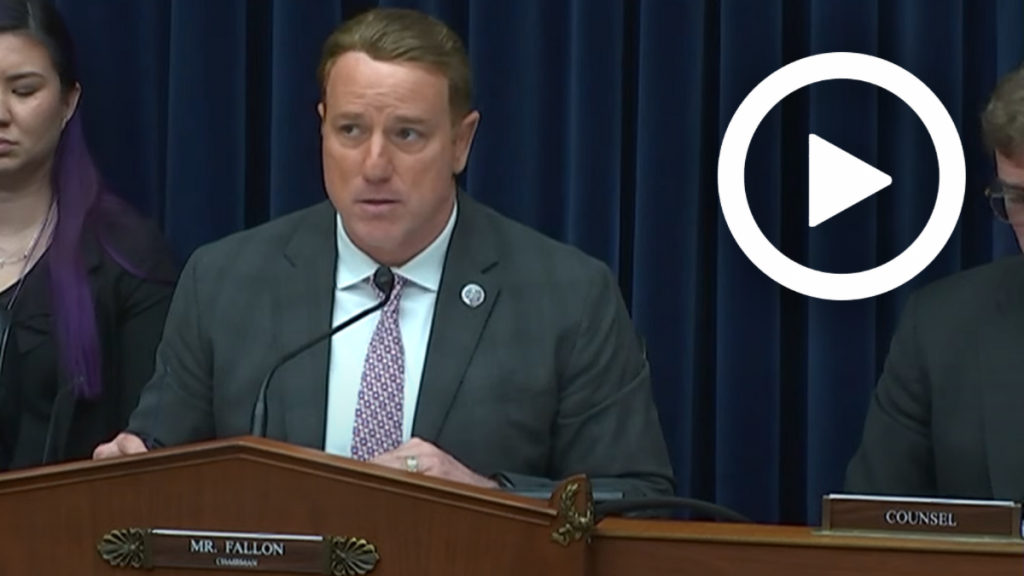Fallon: Biden Administration’s Spending Spree Has Left DOE Vulnerable to Waste, Fraud, and Abuse
WASHINGTON — Subcommittee on Economic Growth, Energy Policy, and Regulatory Affairs Chairman Pat Fallon (R-Texas) opened today’s hearing by slamming the Biden Administration for its rampant spending which more than doubled the Department of Energy’s (DOE) budget without ensuring proper guardrails exist to protect U.S. taxpayer dollars. He continued by emphasizing that Congress must evaluate the safeguards in place at the Department to stop bad actors from stealing funds and prevent improper payments. He concluded by thanking the witnesses for appearing before the subcommittee to assist members in understanding how their offices will ensure that the Department of Energy can and will be good stewards of taxpayer dollars.
Below are Subcommittee Chairman Fallon’s remarks as prepared:
The Biden Administration’s rampant spending spree has put American taxpayer dollars at an even greater risk of waste, fraud, and abuse.
Just take a look at all the alleged “COVID relief” spending. Hundreds of billions of dollars just shoved out the door—into the hands of criminals and fraudsters. This Committee has and will continue to conduct oversight over that money.
Today’s subcommittee hearing will examine the Department of Energy’s budget and spending.
According to the Department of Energy Inspector General, the Inflation Reduction Act, the Infrastructure Investment and Jobs Act, and the CHIPS and Science Act have created “enormous” challenges at the Department.
In fact, the Inspector General said that these are “historic and unprecedented times” at the Department in light of the massive spending.
President Biden and Congressional Democrats’ spending spree grew the Department’s budget from $45.3 billion in 2022 to over $100 billion in 2023.
That’s over twice its size.
Historic and unprecedented times indeed.
Under the Inflation Reduction Act and the Infrastructure Investment and Jobs Act alone, Democrats directed the Department to distribute $336 billion in loans on extremely tight deadlines.
Under one program alone, the Department will need to distribute approximately $32 million per day on average in loans to meet the September 30, 2026 deadline.
The speed and complexity of the review process raises serious concerns about whether the Department can successfully oversee these funds.
The Inspector General also identified several common risks within many Department programs which will get worse under the new spending and loan programs.
These risks include:
Insufficient oversight of projects at the transaction level;
Inadequate internal controls at both the federal and recipient levels;
Potential conflicts of interest and undue influence; and
Compliance problems with contract and grant terms and conditions.
Given these serious challenges, Congress must evaluate the safeguards in place at the Department to prevent waste, fraud, and abuse of American taxpayer dollars.
In a series of reports, the Inspector General highlighted the need to address waste, fraud, and abuse in the agency’s Financial Assistance Awards, Clean Energy Demonstration Projects, the Loan Program Office, and the Weatherization Assistance Program.
Across these programs, the Inspector General highlighted insufficient staffing as a chief concern.
The Department apparently needed to go on a “hiring blitz” to fill vacancies and new roles, raising questions about the qualifications and technical skills of new hires who are brand-new to the Department.
Some of these programs receiving billions of dollars have not been used in decades, meaning their oversight personnel are simply non-existent.
Yet even while the Department has been filling these vacancies, it has also been distributing funds.
Combine this “hiring blitz” with ongoing vacancies in positions intended to oversee these funds, and we are looking at a high risk of disaster.
If that wasn’t enough cause for concern, reports already indicate funds from the Infrastructure Investment and Jobs Act are going to China.
The Department awarded Microvast, a lithium battery company, $200 million of taxpayer dollars despite the company’s primary operations taking place in China, placing it at serious risk of influence by the Chinese Communist Party.
Congress and the American people must be assured that taxpayer dollars are not going to entities owned, operated, or susceptible to control or influence by the Chinese Communist Party.
Today, we welcome our witness from the Department as well as the Inspector General, and look forward to their testimony about how their offices will ensure that the Department of Energy can and will be good stewards of taxpayer dollars.
